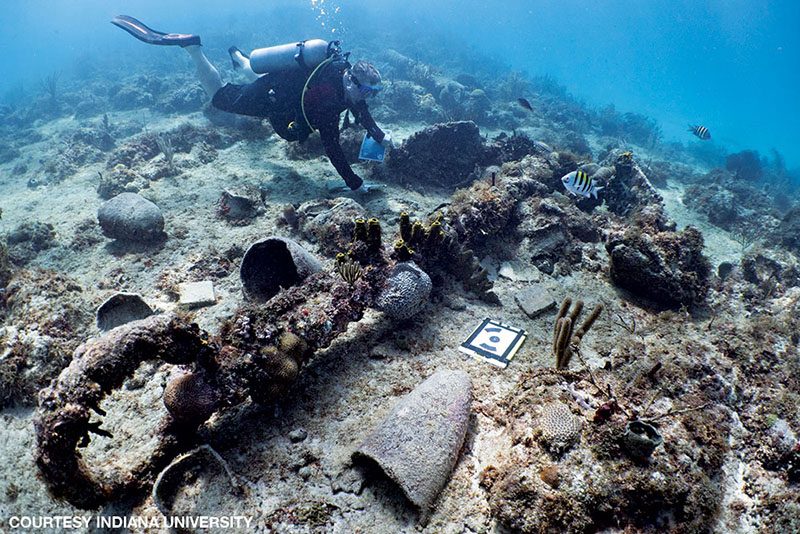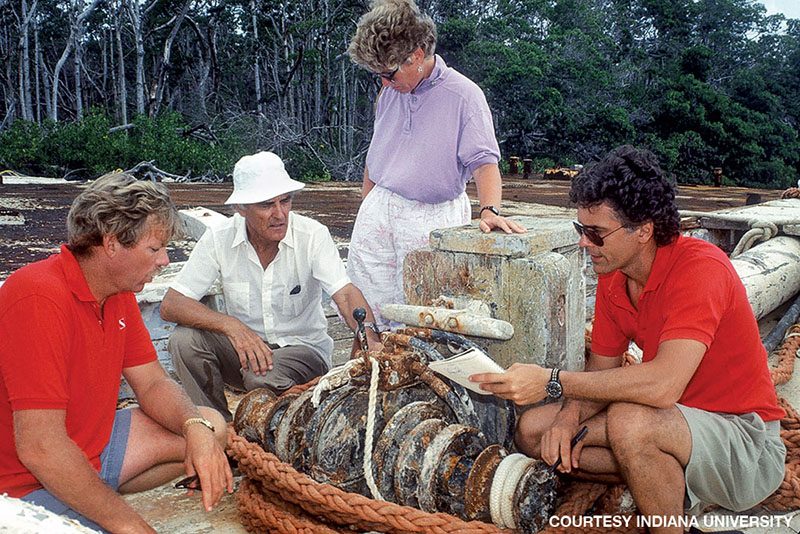Hometown: Bloomington, Indiana
Years Diving: 56
Favorite Dive Destination: La Aleta Taino ceremonial cavern in the Dominican Republic for research, East End Grand Cayman for fun
Why I’m a DAN® Member: As someone working in academic and scientific diving, I recognize that DAN is a worldwide leader for dive safety standards. I encourage all my students and staff to become DAN members.
Charles D. Beeker, a professor at Indiana University (IU), is an expert in marine protected areas and underwater parks and preserves. The director of Indiana University’s Center for Underwater Science and Academic Diving Program, a Registered Professional Archaeologist and PADI Master Instructor, he has been teaching recreational and scientific diving classes for more than 45 years. Beeker served as a member of the federal Archaeological Working Committee for the 1988 Abandoned Shipwreck Act and was appointed to the Marine Protected Areas Federal Advisory Committee in 2005. He has assisted with establishing underwater state parks across the U.S. and in the Caribbean, using a model of multidisciplinary scientific investigations of the submerged cultural and biological resources.
Beeker’s interest in diving started when he was 5 years old. In the late 1950s he began taking swimming lessons at Tucker Lake quarry in Louisville, Kentucky. He remembers seeing people donning scuba gear to go diving and would chase their bubbles as soon as he could swim in deeper water. “That fascinated me,” Beeker said. “My interest began there, going underwater and staying under to explore.”
In 1963 at age 11, he had his first experience with scuba when IU began offering courses. This new world fascinated him. Soon afterward he went to Daytona Beach, Florida, to visit a friend whose family had moved to the area. His friend’s father took both boys scuba diving in the caverns. Beeker recalls being fascinated by these dives: “I remember holding on to a rock in the crystal-clear waters and watching divers descending and disappearing into a hole in the earth. That hooked me.”
When Beeker was a biology major and water polo athlete at IU, his coach and the founding director of IU’s Academic Diving Program, Art Mindheim, approached him about taking an instructor course so he could teach scuba classes. “In those days, scuba certifications were just starting,” Beeker said. “I was just a diver. I didn’t even get certified until I completed my instructor course in John Pennekamp Coral Reef State Park near Key Largo.”

Around the same time, Ralph Erickson, the water polo coach at Loyola University and co-founder of PADI, contacted Mindheim about partnering with IU. With Mindheim’s encouragement, Erickson wrote a letter in 1974 allowing Beeker to take a PADI instructor course.
“That’s what started my career,” Beeker said. In 1984 he became the second director of the Academic Diving Program and introduced the first certification course to IU. The university also became one of the first PADI educational facilities. He founded the Center for Underwater Science in 1992.
Beeker’s interest in underwater archaeology started when he was young and heard stories about shipwrecks in the Florida Keys. “There’s a natural intrigue with shipwrecks,” he said, “and I had it like everybody else.” He has been involved with many underwater archaeological initiatives throughout his career. His committee work to draft legislation for the Abandoned Shipwreck Act of 1988, which helped end the “treasure hunting” mentality, intensified his passion for preserving historic underwater sites.
In 1989 Beeker played a key role in the establishment of the San Pedro Underwater Archaeological Preserve near Islamorada, Florida. The San Pedro was a Spanish galleon that sank in a hurricane in 1733. Because of underwater treasure hunting in the 1960s, only a pile of ballast stones remained to mark where the wreck had been. Beeker assisted the State of Florida in reconstructing the site by placing seven replica cannons, an anchor and an informational plaque and adding buoys for mooring boats. He also played a role in establishing numerous underwater archaeological preserves in Florida, California, the Great Lakes and the Caribbean.
In 2000 Presidential Executive Order 13158 established a national system of marine protected areas under the auspices of the National Oceanic and Atmospheric Administration (NOAA) and the U.S. Department of Interior. Beeker served on the Marine Protected Areas Federal Advisory Committee for four years as an expert in protecting underwater cultural heritage.

He now primarily focuses his efforts in the Dominican Republic, working with the ministries of culture, tourism and environment to prevent treasure hunting and to help protect the country’s underwater resources. He has been instrumental in developing Living Museums in the Sea, a sustainable model for preservation of submerged cultural resources and their associated biodiversity. This network of shipwreck preserves includes the 1724 Guadalupe Underwater Archaeological Preserve and Captain Kidd Underwater Archaeological Preserve.
More recently, Beeker has been working in La Caleta Underwater National Park near Santo Domingo in the Dominican Republic, attempting to trace several artifacts discovered by his team to the Spanish frigate Nuestra Señora de Begoña, sunk in 1725.
Beeker’s research in the Dominican Republic also focuses on the indigenous people known as the Taino, who inhabited Hispaniola prior to the arrival of Europeans in the 15th and 16th centuries. IU researchers have worked on numerous Taino archaeological sites throughout the country, including what Beeker considers to be one of the most important archaeological sites in the Americas: La Aleta. The subject of the Emmy-Award-winning documentary Secrets of the Lost Tribe, La Aleta is a ceremonial sinkhole in the Dominican Republic’s East National Park. It contains thousands of artifacts that give an important and intimate look into life before Christopher Columbus landed in the Americas in 1492.
Beeker was the first to approach the Dominican government looking for something a little different in respect to their historic shipwrecks. “We’re the only ones who came to that country and said, ‘We don’t want a 50-50 split. It all belongs to the government,’” he said. He has seen the positive changes in the government brought on by this new attitude, despite the allure of recovering riches. Beeker is always quick to remind them with a phrase that has become his motto: “You can only sell it once as a treasure hunt. You can sell history forever as a living museum.”
Explore More
Learn more about Charles Beeker, the “underwater Indiana Jones,” in this video.
© Alert Diver — Q2 2019